新概念英语单词第一册第73课:到国王街的走法
新概念第一册词汇语法第73课:ThewaytoKingStreet.docx
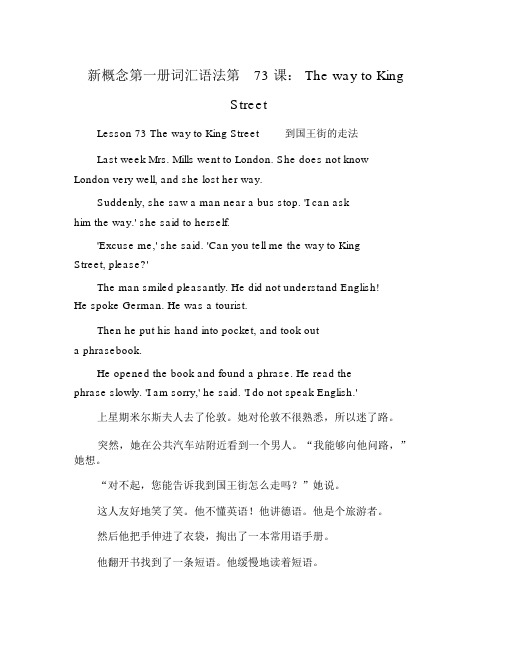
新概念第一册词汇语法第73 课: The way to KingStreetLesson 73 The way to King Street到国王街的走法Last week Mrs. Mills went to London. She does not know London very well, and she lost her way.Suddenly, she saw a man near a bus stop. 'I can askhim the way.' she said to herself.'Excuse me,' she said. 'Can you tell me the way to King Street, please?'The man smiled pleasantly. He did not understand English!He spoke German. He was a tourist.Then he put his hand into pocket, and took outa phrasebook.He opened the book and found a phrase. He read thephrase slowly. 'I am sorry,' he said. 'I do not speak English.'上星期米尔斯夫人去了伦敦。
她对伦敦不很熟悉,所以迷了路。
突然,她在公共汽车站附近看到一个男人。
“我能够向他问路,”她想。
“对不起,您能告诉我到国王街怎么走吗?”她说。
这人友好地笑了笑。
他不懂英语!他讲德语。
他是个旅游者。
然后他把手伸进了衣袋,掏出了一本常用语手册。
他翻开书找到了一条短语。
他缓慢地读着短语。
”很抱歉,“他,”我不会英。
” 1.She does not know London very well. 她敦不很熟悉。
新概念英语第一册第73-74课:The way to King Street
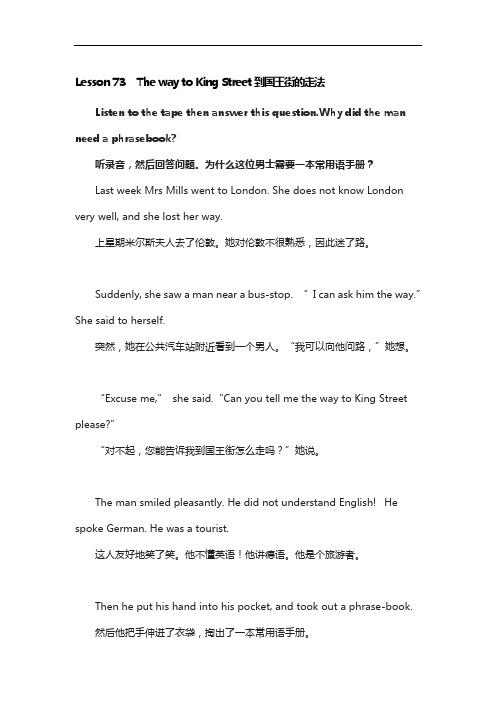
Lesson 73 The way to King Street到国王街的走法Listen to the tape then answer this question.Why did the man need a phrasebook?听录音,然后回答问题。
为什么这位男士需要一本常用语手册?Last week Mrs Mills went to London. She does not know London very well, and she lost her way.上星期米尔斯夫人去了伦敦。
她对伦敦不很熟悉,因此迷了路。
Suddenly, she saw a man near a bus-stop. “I can ask him the way.”She said to herself.突然,她在公共汽车站附近看到一个男人。
“我可以向他问路,”她想。
“Excuse me,”she said.“Can you tell me the way to King Street please?”“对不起,您能告诉我到国王街怎么走吗?”她说。
The man smiled pleasantly. He did not understand English! He spoke German. He was a tourist.这人友好地笑了笑。
他不懂英语!他讲德语。
他是个旅游者。
Then he put his hand into his pocket, and took out a phrase-book.然后他把手伸进了衣袋,掏出了一本常用语手册。
He opened the book and found a phrase. He read the phrase slowly. 他翻开书找到了一条短语。
他缓慢地读着短语。
“I am sorry,”he said. “I do not speak English.””很抱歉,“他说,”我不会讲英语。
新概念第一册73课
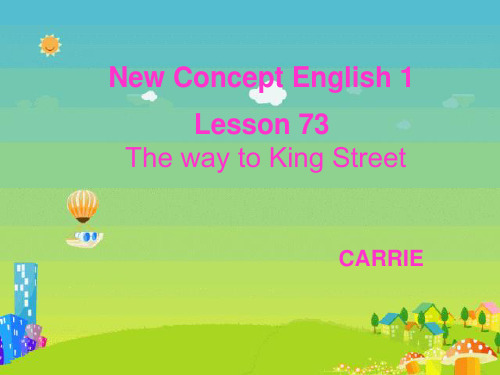
What did Mrs. Mills do last week?
She went to London.
Does she know London well?
No, she doesn’t.
What happened to her? (Did she lose her way?)
She lost her way.
• 4. lose one’s way 迷路(丢失了某人的路)。 lose的过去式是lost • 5. She does not know London very well, and she lost her way. 这里的and相当于so。 • eg: It rained heavily and we stayed at home. • ▲但是要注意,这句话里前一部分是一般事实 情况所以用的一般现在时,而后一部分是上周 发生的事所以用的过去时。 • 6. Suddenly 既可以放在句首,也可以放在句中 或句末。
• 7. see的过去式是saw • see:看见,及物动词,强调结果,see sth. • look:看,不及物动词,强调动作,look at sth. • 8. near 在附近。扩展:其他方位介词。 • 9. can 能够。扩展:其他情态动词。 • 结构:情态动词+动词原形。变疑问句时情态动 词提前。 • eg:I can sing. • → Can you sing? • He can swim. • → Can he swim?
• 13. tell sb. sth. 告诉某人某事。tell的过去式是 told • 14. the way to… 去某地的路,去某地的走法 • eg: the way to Ji’nan / the library/ the nearest post office • 15. The man smiled pleasantly. 这里的 pleasantly是个副词,修饰动作smile。(第二 节课详细讲) • smile的过去式是smiled • 16、understand的过去式是understood • 20. then [adv.] 然后,表示过渡。
新概念英语第一册课文翻译及学习笔记Lesson73
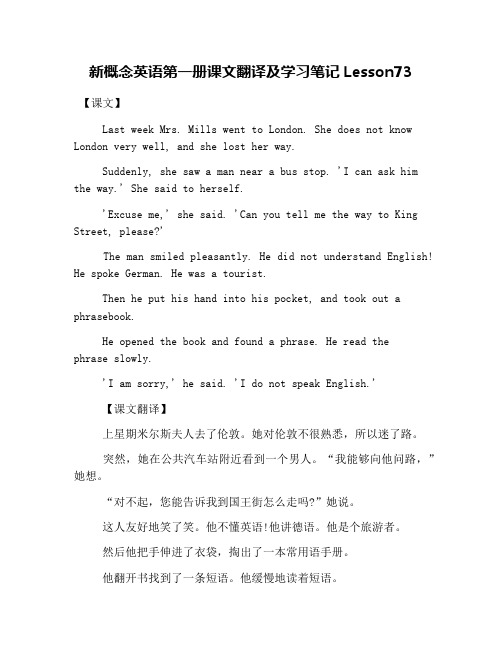
新概念英语第一册课文翻译及学习笔记Lesson73【课文】Last week Mrs. Mills went to London. She does not know London very well, and she lost her way.Suddenly, she saw a man near a bus stop. 'I can ask him the way.' She said to herself.'Excuse me,' she said. 'Can you tell me the way to King Street, please?'The man smiled pleasantly. He did not understand English! He spoke German. He was a tourist.Then he put his hand into his pocket, and took out a phrasebook.He opened the book and found a phrase. He read thephrase slowly.'I am sorry,' he said. 'I do not speak English.'【课文翻译】上星期米尔斯夫人去了伦敦。
她对伦敦不很熟悉,所以迷了路。
突然,她在公共汽车站附近看到一个男人。
“我能够向他问路,”她想。
“对不起,您能告诉我到国王街怎么走吗?”她说。
这人友好地笑了笑。
他不懂英语!他讲德语。
他是个旅游者。
然后他把手伸进了衣袋,掏出了一本常用语手册。
他翻开书找到了一条短语。
他缓慢地读着短语。
“很抱歉,” 他说,“我不会讲英语。
”【生词】week n. 周London n. 伦敦suddenly adv. 突然地bus stop 公共汽车站smile v. 微笑pleasantly adv. 愉快地understand (understood ) v. 懂,明白speak (spoke ) v. 讲,说hand n. 手pocket n. 衣袋phrasebook n. 短语手册,常用语手册phrase n. 短语slowly adv. 缓慢地【知识点讲解】在新概念一的课本里,73课前面有一个小测试,有书的同学能够自己做一下检验一下学到现在的水平。
新概念英语第一册73-74课课文详解、翻译及语法
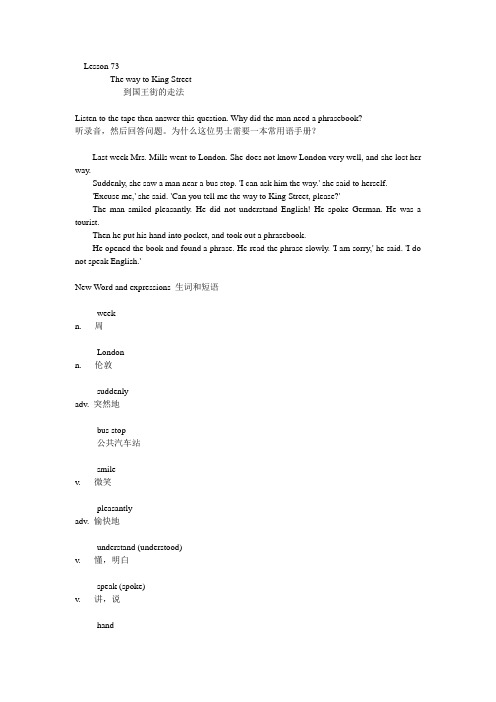
Lesson 73The way to King Street到国王街的走法Listen to the tape then answer this question. Why did the man need a phrasebook?听录音,然后回答问题。
为什么这位男士需要一本常用语手册?Last week Mrs. Mills went to London. She does not know London very well, and she lost her way.Suddenly, she saw a man near a bus stop. 'I can ask him the way.' she said to herself.'Excuse me,' she said. 'Can you tell me the way to King Street, please?'The man smiled pleasantly. He did not understand English! He spoke German. He was a tourist.Then he put his hand into pocket, and took out a phrasebook.He opened the book and found a phrase. He read the phrase slowly. 'I am sorry,' he said. 'I do not speak English.'New Word and expressions 生词和短语weekn. 周Londonn. 伦敦suddenlyadv. 突然地bus stop公共汽车站smilev. 微笑pleasantlyadv. 愉快地understand (understood)v. 懂,明白speak (spoke)v. 讲,说handn. 手pocketn. 衣袋phrasebookn. 短语手册,常用语手册phrasen. 短语slowlyadv. 缓慢地参考译文上星期米尔斯夫人去了伦敦。
新概念英语单词第一册第73课到国王街的走法

1 / 4新概念英语单词第一册第73课:到国王街的走法【单词例句】A:How long will the meeting last? A:这次的会议要持续多长时间?B:It will last for about one week. B:大约要持续一周时间。
London ['lndn]伦敦suddenly ['sd()nl] adv.突然地【单词例句】A:I feel quite embarrassed for suddenly having to makethis kind of request. A:突然不得不提出这样的请求,实在不好意思。
B:It doesn't matter. Go ahead, please. B:没关系,请说吧。
bus [bs] stop [stp]公共汽车站smile [smal]微笑【单词例句】A:To go to the English Comer is to give you a goodchance to open your mouth to speak.A:去英语角就是给你一个开口说英语的好机会。
B:MaybeI can go thereto have a try. B:也许我能够去那儿试一试。
2 / 4hand [hnd]手【派生词】handkerchief手帕【单词扩充】arm手臂【单词搭配】hand in hand手牵于hands up举手give a hand协助【单词例句】A:Hold the steering wheel with your hands at teno'clock and two o'clock. A.把手握在方向盘的10点及2点钟方向。
B:And what shallI do then? B:我接着该这么做?pleasantly ['plezntli]adv愉快地understand ['plezntli]懂,明白【派生词】understanding理解nusunderstand误解【单词搭配】understand each other互相了解【单词例句】A:We have to be fair about these things A:对这种事情,我们一视同仁。
新概念一73课课件
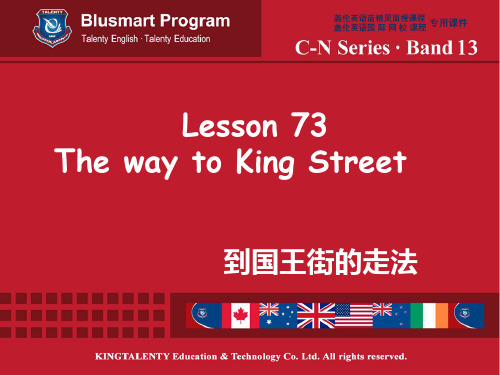
1.I don`t know the way ____England. A.on B. to C. for D. in 2. The little girl _____ her way yesterday. A. lose B. loses C. lost D. losing
短语总结
上周 对…很了解 迷路 向某人问路 自言自语 去某地的路 把…放进… 拿出 说英语
He understood English.
7.He spoke German. He was a tourist.
speak German spoke是speak的过去式 was是is的过去式 tour 旅行、旅途 → tourist 旅行者,旅Байду номын сангаас的人
7.Then he put his hand into his pocket , and took out a phrasebook.
Yes , she did ./No , she didn’t .
I _w_e_n_t (go) to the swimming pool last
week.
2.She does not know London very well , and she lost her way.
know … very well 对…很熟悉或了解 know的过去式是knew 我对他很了解。 I know him very well. 我对这个城市不熟悉。 I don’t know the city very well. lose one’s way 迷路(丢失了某人的路) =be lost= get lost lose的过去式是lost
speak
1.Where _w_as_he last week ? He _w_a_s in London. 2.I always say _t_o _myself ‘ I should study hard.’ 3.Did you tell the_w_a_y to King Street ? 4.Please take _ou_t_your exercises book. 5.Please put the book _i_nt_o_your bag.
Lesson73ThewaytoKingStreet(课件)新概念英语第一册

The way to King Street
London
Where was Mrs. Mills?
Last week Mrs. Mills went to London. She does not know London very well,and she lost her way.
yesterday afternoon 昨天下午
yesterday
evening 昨天晚上 last night昨天夜里
last month 上个月 last week 上周 last year 去年
The man
.
副词的用法: 副词主要用来修饰动词,形容词,副词或整个句子。 副词的位置:动词+副词;
The man smiled pleasantly. He did not understand English! He spoke German. He was a tourist.
Then he put his hand into pocket, and took out a phrasebook.
to London. ,and
Suddenly, she saw a man near a bus stop. 'I can ask him the way.' she said to herself. 'Excuse me,' she said. 'Can you tell me the way to King Street, please?'
Suddenly, she saw a man near a bus stop. 'I can ask him the way.' she said to herself.
新概念英语1 Lesson73
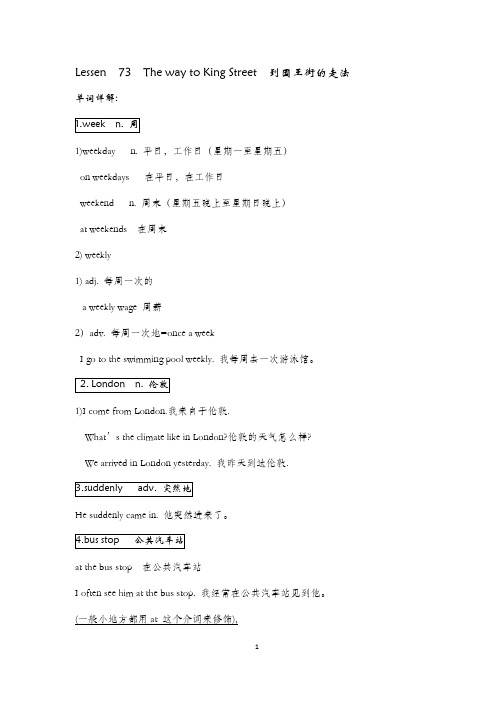
Lessen 73 The way to King Street 到国王街的走法单词详解:1)weekday n. 平日,工作日(星期一至星期五)on weekdays 在平日,在工作日weekend n. 周末(星期五晚上至星期日晚上)at weekends 在周末2) weekly1) adj. 每周一次的a weekly wage 周薪2)adv. 每周一次地=once a weekI go to the swimming pool weekly. 我每周去一次游泳馆。
1)I come from London.我来自于伦敦.What’s the climate like in London?伦敦的天气怎么样?We arrived in London yesterday. 我昨天到达伦敦.He suddenly came in. 他突然进来了。
at the bus stop 在公共汽车站I often see him at the bus stop. 我经常在公共汽车站见到他。
(一般小地方都用at 这个介词来修饰),如:at the railway station 在火车站at the airport 在飞机场1) vi. 微笑(注意smile 与smell发音的区别)I smiled at the children 我对孩子们微笑了下。
2)n. 微笑give sb a friendly smile 对某人友好地微笑区分:laugh 出声的笑,大笑He always laughs loudly. 他总是大声地笑。
laugh at…嘲笑某人Don’t laugh at others.He smiled pleasantly. 他亲切地微笑pleasant adj. The climate here is very pleasant.这里的天气非常舒服例句1:The book is very hard to understand. 这本书很难懂。
新概念英语第一册第73-74课-通往王者之路

新概念英语第一册第73-74课:通往王者之路Xx概念英语书第一课73-74 :去国王街的路第73课去国王街的路去国王街听录音,然后回答问题。
为什么这个人需要一本常用语手册?听录音,然后回答问题。
为什么这个人需要一本常用语手册?上周米尔斯夫人去了伦敦。
她不太了解伦敦,因此迷了路。
米尔斯夫人上周去了伦敦。
她不太了解伦敦,所以迷了路。
突然,她在公共汽车站附近看到一个男人。
“我可以问路。
”她对自己说.突然,她在公共汽车站附近看到一个男人。
“我可以向他问路,”她想。
“对不起,”她说。
"你能告诉我去国王街的路吗?""对不起,你能告诉我去国王街的路吗?"她说。
那个人愉快地笑了.他不懂英语!他会说德语.他是一名游客.那人友好地笑了笑。
他不懂英语!他会说德语。
他是一名游客。
然后他把手伸进口袋,拿出一句话——书.然后他把手伸进口袋,拿出一本常用语手册。
他翻开书,发现了一句话。
他慢慢地读了这个短语.他打开书,发现了一个短语。
他慢慢地读了这个短语。
“对不起,”他说。
“我不会说英语。
”“对不起,”他说,“我不会说英语。
”新单词和短语周n .周伦敦n .伦敦突然地adv .突然地公共汽车站公共汽车站微笑五.微笑愉快地adv .愉快地理解五.明白,明白。
说话五.说,说手n .手口袋n .口袋常用语手册n .短语和短语手册短语n .短语缓慢地adv .缓慢地课文注释1.她迷路了。
所以她迷路了。
当‘so’说话时,句子中的and表示结果。
她对自己说,她对自己想。
第74课他们做了什么?他们做了什么?新单词和短语新单词和短语匆忙地adv .匆忙去五.去切口五.停,停迎接五.问候,问好如饥似渴地adv .干渴的土地第73-74课自学指南第一件事第一篇课文详细注释课文的进一步注释1.她不太了解伦敦。
她对伦敦不太熟悉。
短语“知道…嗯”的意思是“知道…的事”。
另一个例子:我不太了解他。
我不太了解他。
2.…她迷路了。
新概念英语第一册73课讲解课文

新概念英语第一册73课讲解课文Lesson 73: The Way to King Street.Introduction.Lesson 73 from New Concept English Book 1 introduces students to the concept of asking for directions in English. The lesson focuses on the vocabulary and structure neededto describe locations, routes, and asking for help infinding places. Through the story of Mrs. Mills, students are exposed to real-life situations where knowledge of directions is crucial.Vocabulary.The lesson introduces a range of vocabulary related to asking for directions, such as "street," "block," "turnleft/right," "crossroads," and "opposite." Students are encouraged to familiarize themselves with these words and their meanings to enhance their ability to navigate inEnglish.Structure.The lesson follows a typical dialogue format between Mrs. Mills and a passerby. It demonstrates the use of present simple tense for general statements and the past simple tense for actions that occurred in the past. This helps students understand the difference between the two tenses and when to use them appropriately.Key Concepts.One of the key concepts introduced in this lesson is the use of prepositions to describe locations. Students learn how to use words like "on," "in," "at," "near," "behind," and "between" to describe the position of places relative to each other. This knowledge is crucial for building spatial awareness and for accurately communicating locations in English.Cultural Notes.The lesson also provides an opportunity to explore cultural differences in asking for directions. Students learn that in some cultures, it is considered polite to apologize when asking for help, as Mrs. Mills does when she says, "I'm sorry, I don't know London very well." This cultural insight helps students better understand and adapt to different social norms when communicating in English.Practical Application.The practical application of this lesson extends beyond the classroom. Students can apply the vocabulary and structures learned in Lesson 73 to real-world situations where they need to ask for directions or provide directions to others. This practical application enhances their language skills and boosts their confidence in using English in everyday life.Conclusion.In summary, Lesson 73 from New Concept English Book 1is a valuable resource for teaching students about asking for directions in English. It covers important vocabulary, grammar structures, and cultural insights that help students develop their language skills and enhance their ability to navigate in English-speaking environments. By practicing the concepts introduced in this lesson, students can improve their confidence and fluency in using English for practical communication tasks.。
新概念第一册 Lesson73
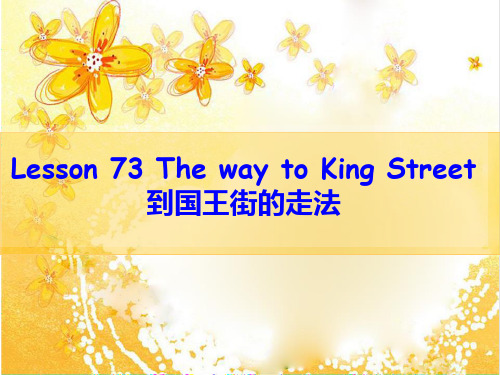
形容词、副词
• 形容词是什么?副词又是什么?我们用一个句子 来说明。She is a good student, and she works hard. 本句中,good 就是形容词,而hard 则是副词 • 形容词用来修饰名词或代词, 表示人或事物的性质 , 状态,和特征。 • 副词是一种用来修饰动词,形容词,副词或全句的词 ,说明时间,地点,程度,方式等概念。
选择正确的词填空
1. You are_____beautiful.(副词,非常/十分) 2. Please drive _____(slow, slowly). 3. He can speak English__________(very good, very well) 4. He ran out of room _______(hurried, hurriedly). 5. He greeted me________(warm, warmly) 6. He gave me a ______(warm, warmly)welcome.
slowly lazily badly carefully suddenly
• 1.Lily doesn't know Hong Kong very well, and she____________last month. • A, lost the way B, losing her way C, lost her way D, lose her way • 2.You'd better drive_________at night. • A, slow B, careful C, slowly D, care • 3.Excuse me, can you tell me the way__the Big Ben? • A, for B, to C, of D, at • 4.A: Where____you yesterday afternoon? B: I______in the library. • A, were; was B, was; were C, were; was D, was; was • 5."How silly of me!" the man said______. • A, to himself B, with him C, for himself D, by him
Lesson 73-74 The way to king street新概念一册教师用课件

gave
•drink
• drinks drunk
drinking
• meets meeting
•meet met
•swim •swims •swimming swam
•understand •understands •understanding •understood
watch the flash
•slowly •adv. 缓慢地 •lose vt. 丢失
•过去式;lost
动词的四种形式
•find • finds finding found •lose • loses losing lost •cut • cuts cutting cut •eat • eats eating ate
•give •ives giving
•写出下面规则 动词的过去式
• cook
• rain
•jump
• snow
•remember • arrive
•remain • live
• play
• call
• enjoy
• stop
•dust • sharpen • turn • climb •type •clean
•paint • show • boil • lift •like •want
•What’s the matter with ls?
Lesson 74 words
•hurriedly •adv. 匆忙的 •cut v. 割,切
•thirstily •adv. 口渴的 •go v. 走 •greet v. 问候, 打招呼
adj. adv.
•形容词变副词 •adj.+ly •ly 是副词后缀。
新概念英语第一册Lesson73~78课文详注

【导语】新概念系列教材的经典早已不⾔⽽喻。
其⽂章短⼩精悍,语句幽默诙谐,语法全⾯系统,历来被公认为是适合⼤多数中学⽣课外学习的资料之⼀。
⽆忧考为您整理了以下内容,仅供参考。
希望可以帮助到您!如果您想要了解更多相关内容,欢迎关注⽆忧考!新概念英语第⼀册Lesson73~74课⽂详注 1.She does not know London very well. 她对伦敦不很熟悉。
know…well这⼀短语意为"对……了解"。
⼜如: I don't know him very well. 我不太了解他。
2.…and she lost her way. …因此她迷路了。
句中的 and当"所以"讲,表⽰结果。
lose one's way, 迷路。
3.ask(sb.) the way, (向某⼈)问路。
4.say to oneself, ⼼中暗想。
注意:talk to oneself意为"⾃⾔⾃语地说"。
5.Can you tell me the way to King Street, please? 您能告诉我到国王街怎么⾛吗? tell sb. the way(to), 告诉某⼈(去……的)路。
6.cut himself= cut his face。
以整体代替部分是英语中的⼀种修辞格,叫提喻(merism )。
新概念英语第⼀册Lesson75~76课⽂详注 1.Do you have any shoes like these? 像这样的鞋你们有吗? 这个句⼦⾥的 like these是介词短语作定语,修饰 shoes,意思是"像这样的鞋⼦"。
2. What size? 什么尺码的? 这是⼀个省略句,后⾯省略了 do you want。
下⽂中的 What colour? 同样也是省略句。
what size通常⽤来询问服装、鞋⼦、⼿套等的尺⼨,即什么号码: What size do you wear? 你穿⼏码的? 3.They are very uncomfortable.的确很不舒适。
- 1、下载文档前请自行甄别文档内容的完整性,平台不提供额外的编辑、内容补充、找答案等附加服务。
- 2、"仅部分预览"的文档,不可在线预览部分如存在完整性等问题,可反馈申请退款(可完整预览的文档不适用该条件!)。
- 3、如文档侵犯您的权益,请联系客服反馈,我们会尽快为您处理(人工客服工作时间:9:00-18:30)。
新概念英语单词第一册第73 课:到国王街的走法
【单词例句】
A:How long will the meeting last?
A:这次的会议要持续多长时间?
B:It will last for about one week.
B:大约要持续一周时间。
London ['lndn] 伦敦
sudde nly ['sd() nl ] adv.突然地
【单词例句】
A: I feel quite embarrassed for suddenly having to makethis kind of request.
A:突然不得不提出这样的请求,实在不好意思。
B: It doesn't matter. Go ahead, please.
B:没关系,请说吧。
bus [bs] stop [stp]公共汽车站
smile [smal]微笑
【单词例句】
A: To go to the English Comer is to give you a goodchance to open your mouth to speak.
A:去英语角就是给你一个开口说英语的好机会。
B: MaybeI can go thereto have a try.
B:也许我能够去那儿试一试。
hand [hnd] 手
【派生词】handkerchief 手帕
【单词扩充】arm 手臂
【单词搭配】hand in hand手牵于ha nds up举手give a hand协助
【单词例句】
A:Hold the steering wheel with your hands at teno'clock and two o'clock.
A. 把手握在方向盘的10点及2点钟方向。
B:And what shallI do then?
B:我接着该这么做?
pleasantly ['plezntli]adv 愉快地
understand ['plezntli] 懂,明白
【派生词】understanding 理解nusunderstand 误解
【单词搭配】understand each other 互相了解
【单词例句】
A: We have to be fair about these things
A:对这种事情,我们一视同仁。
B: I understand your position.
B. 处在你们的位置,这样做我很理解。
speak [spik]讲,说
【派生词】speaker 喇叭
【单词扩充】relate 叙述say 说,讲
【单词搭配】speak out 大声说speak on 继续说
【派生词】pickpocket 扒手
【单词扩充】pouch 小袋
【单词搭配】pick a pocket 扒窃out of pocket 赔钱
【单词例句】
A:When you get on the front of the bus, just drop yourmoney into the box.
A:你从车的前门上车时,把钱丢进钱箱就行了。
B:What shall I do if I happen to have no change in mypocket?
B:如果我口袋里刚好没有零钱,那怎么办?
phrasebook phrasebook 短语手船,常用语手册
phrase [frez]短语
slowly ['sll] adv 缓慢地
【单词例句】
A: Some people want to be in shape in a short time, sothey overstress their bodies and get hurt that way.
A:有些人想在短时间内拥有好身材,于是过度锻炼,导致受伤。
B:That's wrong. I take it slowly and enjoy it. B:那是不对的,我仅仅慢慢实行,享受运动的乐趣而己。
【单词搭配】go abroad出国go to school去上学go on 继续go against反对
【单词例句】
A: When shall we go?
A:我们什么时候走?
B:Mary is not ready. Let's wait for her.
B:玛丽还没做好准备,我们等等她。
greet [ g rit]问候,打招呼。
